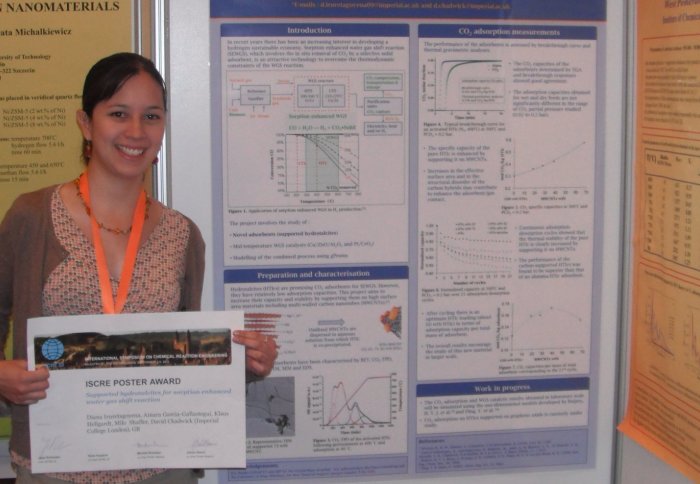PhD Student Wins Best Poster at ISCRE22

Diana stands in front of her winning poster
PhD student Diana Iruretagoyena was awarded the prize for best poster at the 22nd International Symposium on Chemical Reaction Engineering
At the 22nd International Symposium on Chemical Reaction Engineering (ISCRE), held in Maastricht in early September, PhD student Diana Iruretagoyena presented her research on Supported Hydrotalcites for Sorption Enhanced Water Gas Shift Reaction and was awarded the best poster prize, beating over 250 participants to the top spot.
The ISCRE is recognised as being the main conference in the field of Reaction Engineering and attracts many participants from all over the world including young and experienced researchers from both academia and industry. The first ISCRE was held in 1957 and takes place every two years.
Hydrogen is nowadays regarded as a key clean fuel for the future. One of the most important stages of industrial hydrogen production is the transformation of CO and H2O into CO2 and H2 (water gas shift reaction). However, this reaction is equilibrium limited so the in situ removal of CO2 can enhance markedly the productivity of hydrogen. Hydrotalcites are promising solid adsorbents for this application and recently a lot of research has focused on finding ways to further improve their adsorption performance. Diana presented a successful new strategy to improve the adsorption capacity and the thermal stability of hydrotalcites by supporting them on multi-walled carbon nanotubes. The results are relevant for industrial application and have provided new insights on fundamental aspects of CO2 adsorption.
Speaking about her success, Diana said "According to the jury they gave me the award because the work was very original and addresses a relevant and timely topic in the field showing high quality results. In addition, they considered that I was able to discuss it at a high level. The prize proved me that my work is considered interesting by top researchers in the field. This encourages me to keep working hard in my PhD. It is important to mention that this achievement was possible thanks to the support of my supervisors David Chadwick and Klaus Hellgardt, the fruitful collaboration with Milo Shaffer’s group in the Department of Chemistry".
Article text (excluding photos or graphics) © Imperial College London.
Photos and graphics subject to third party copyright used with permission or © Imperial College London.
Reporter
Press Office
Communications and Public Affairs
- Email: press.office@imperial.ac.uk
